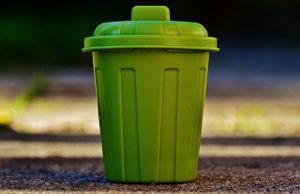It’s that time of year again—the time for spring cleaning!
I’m feeling the urge to throw things away. Everywhere I look it seems I see too much stuff.
On the desk, those papers, they need to go. In the closet, way too much. I haven’t worn that for a couple years. Out out out!
The Origin of Spring Cleaning
The urge to clean is one of the main responses I have to spring, besides craving more sun and wanting to eat fewer calories.
Turns out I’m not the only one.
There are several stories about the origin of “spring cleaning.” One says that it began in response to coal, oil, and wood heating, which left the house and its furnishings thick with smoke and soot that had to be cleaned out and aired out in spring.
Other origin stories are connected to religious traditions, such as the Jewish scouring the house during Passover in a ritual tied to ridding all cabinets of leavened products, or the Chinese scrubbing every inch to prepare for the Chinese New Year.
You may or may not feel the urge to clean as the weather gets warmer, but if you’re reading this, that means you’re probably a creative person, which means you’d be wise to go with the flow.
Why?
According to recent studies, spring cleaning can not only help stimulate your creativity, but may also help decrease your stress and recharge your career.
 Spring Clean Your Stuff, As Too Much Can Kill Creativity
Spring Clean Your Stuff, As Too Much Can Kill Creativity
Make sure as part of your spring-cleaning that you contribute a good amount of stuff to the trash.
According to a 2014 study, the more “stuff” you have, the less creative you are.
In our current consumption-based culture, most of us are not lacking in terms of products. The researchers wondered how that may be affecting creativity.
They pointed out that thinking performance data gathered over the past 50 years shows that even though IQ scores are rising, creative thinking scores are doing the opposite—they’ve been declining since 1990, particularly in young children.
“Once we become used to not being creative—to being merely passive consumers—it seems that the creativity muscle begins to atrophy,” said lead researcher Ravi Mehta, “which does not bode well for future generations.”
Spring Clean—It’s Okay to Live Without It!
Scarcity, on the other hand, seems to encourage creativity, as we look for new ways to use the few things we have.
“What we found is that abundant resources may have a negative effect on creativity,” Mehta added. “When you have fewer resources, you use them more creatively.”
If we think of this in terms of writing, we can see how having so many storytelling options at our fingertips—from movies to ebooks to graphic novels to television and more–can make it harder for us to create our own original tales.
Imagine for a moment how much more creative you might be if you lived in a world where none of these things existed. You’d crave stories so much you’d likely be much more motivated to create them yourself.
Abundance Kills Creativity!
Does abundance kill creativity? Entrepreneur and award-winning author Jonathan Fields thinks so.
“[O]ften times, the difference between crap and craft isn’t more, but less. Constraint forces creativity. Fewer resources means the essential nature, the soul of your output, has to be that much better to break through all the noise. Even more, constraint in one area of work or life makes you more creative in all areas.”
Perhaps if you’re starving artist, you can find comfort in the fact that your current situation may help you produce some of your best work.
If you’re living more easily, though, consider the idea that your comfort may be making it too tempting to ignore your latest project. Consider cutting back on a few things to jolt yourself out of your winter hibernation and get you feeling hungry again.
 Reasons to Spring Clean: It Frees Your Imagination
Reasons to Spring Clean: It Frees Your Imagination
Though some research shows that a messy desk can actually help encourage creativity, other studies have found that clutter, in general, increases stress, which can make it harder to find the muse when we’re ready to write.
A 2012 study noted that moms, in particular, suffer from a rise in stress hormones whenever they’re faced with the clutter in their homes.
Clutter distracts us, making it more difficult to focus on a project, and signals the brain that its work isn’t done, making it difficult to relax and get the downtime that we need.
Even if you intend to get rid of stuff, it can be hard to let things go.
A second 2012 study used brain-imaging technology to show that for some people, especially, getting rid of things lit up the same areas of the brain associated with the pain of being burned by hot coffee.
Clutter Limits Your Ability to Stay Focused
If this is how you feel, try to remember times in the past when you got rid of things. You forgot about it, didn’t you?
Most of us can’t even remember what we threw out last year. Clutter limits your brain’s ability to stay focused on what you’re doing—and you need to stay focused when writing.
Your office or writing space is an important place to apply your spring-cleaning muscles.
“If there’s clutter where you work,” says bookseller Leah Dearborn, “get a trash bag. If you can’t recall the last time you used something, chances are fairly good that you won’t miss it.”
Before you start cleaning, ask yourself:
- Is this space meeting my needs? If not, how do I need to change it?
- Are there things here I don’t need anymore? (If so, donate or trash them.)
- Are there things I need to make my office more efficient?
Don’t forget the clutter on your computers and gadgets, as well. Organize your files, consider dumping old stuff onto an external memory stick, and clean out the areas you regularly use so they’re ready for your new creations.
 Spring Cleaning May Help Jumpstart Your Career
Spring Cleaning May Help Jumpstart Your Career
Could cleaning up around the place help you be a more successful writer?
It’s possible. Some recent studies have connected cleanliness with success.
A 2001 study out of the University of Michigan showed that parents who kept their homes clean and organized had children that grew up to complete more years of school and to earn about $3,000 more per year than those who grew up in dirty homes.
“Keeping a clean and organized home reflects an overall ability and desire to maintain a sense of order in a wide range of life activities,” said researcher Rachel Dunifon. “These are qualities that also seem to be important in predicting intergenerational success.”
It wasn’t about hours spent cleaning, either. In fact, time spent cleaning wasn’t measured—only how clean and organized the home seemed to be to outside inspectors.
This research focused on how a clean home might affect a child’s later success in life, but it doesn’t seem to far a stretch to imagine that adults who keep their homes clean and organized may also experience benefits in other areas of their lives—like their writing careers.
Tips to Help You Spring Clean Your Writing Career
You can take your spring-cleaning a little further to be sure you experience this effect. Try these tips to “spring clean” your writing career:
Take stock of where you are right now.
Are you enjoying your writing? Have you progressed as far as you hoped you would at this point in your life? If not, write down what’s lacking, and what steps you can take to move forward.
Check your schedule.
What is competing for your time that you can cut back on? Focus on those projects that are most important to you and discard the rest.
What needs to go?
Do you have clients that pay little but take up a lot of your time? Do you have self-published books that need to be updated or withdrawn? Old projects you’re never going to return to that are sitting there staring at you from your computer screen?
Clear out the old to make room for the new.
What needs planting?
A writing career is all about planting seeds and harvesting the crop down the road. Maybe you need to send out more submissions to see if any will bear fruit. Maybe it’s time to craft a new marketing plan for an upcoming book.
Think about the things you want to happen six months to a year from now, and determine what seeds you need to plant today.
Touch up your online presence.
What’s old and outdated? Where do you need to spruce things up? Check things like your About page, your social media profiles, and other online areas that could use maybe an updated photo, description, or design to reflect where you are now in your career, and where you’re headed.
 Don’t Forget to Get Outside!
Don’t Forget to Get Outside!
Finally, after you’re done cleaning, don’t forget to get out and enjoy the spring weather.
Many writers hunker down in the winter months to produce, but all that time inside over the computer can leave us feeling dull and cranky.
That’s why it’s important to your creativity and your overall wellness to make some time to get out and enjoy yourself.
Says award-winning novelist Kathy Steffen:
“As artists and writers, refreshing our creativity is of the utmost importance, and a step we usually skip in our creative process. As Julia Cameron advises in The Artist’s Way, go on an artist date once a week to explore. Whether visiting a museum or finger painting, do whatever excites and interests you. Seem like a waste of time? Absolutely not. You are filling the creative well and inspiring your muse.”
Do you apply your spring-cleaning to your writing as well as your home? Please share any tips you may have with our readers.
Sources
Ravi Mehta, Meng Zhu, “Creating When You Have Less: The Impact of Resource Scarcity on Product Use Creativity,” Journal of Consumer Research, 2015; ucv051, DOI: 10.1093/jcr/ucv051, http://jcr.oxfordjournals.org/content/early/2015/10/01/jcr.ucv051.
Meg Sullivan, “Trouble in paradise: UCLA book enumerates challenges faced by middle-class L.A. families,” Newsroom UCLA, June 19, 2012, http://newsroom.ucla.edu/releases/trouble-in-paradise-new-ucla-book.
Sherrie Bourg Carter, “Why Mess Causes Stress: 8 Reasons, 8 Remedies,” Psychology Today, March 14, 2012, https://www.psychologytoday.com/blog/high-octane-women/201203/why-mess-causes-stress-8-reasons-8-remedies.
David F. Tolin, et al., “Neural Mechanisms of Decision Making in Hoarding Disorder,” Arch Gen Psychiatry, August 2012; 69(8):832-841, http://archpsyc.jamanetwork.com/article.aspx?articleid=1307558.
McMains S., Kastner S., “interactions of top-down and bottom-up mechanisms in human visual cortex,” J Neurosci, January 12, 2011; 31(2):587-97, http://www.ncbi.nlm.nih.gov/pubmed/21228167.
Diane Swanbrow, “Clean homes can boost children’s adult education and earnings,” University of Michigan, March 4, 2001, http://www.ns.umich.edu/new/releases/3865-clean-homes-can-boost-children-s-adult-education-and-earnings.
Susan Adams, “10 Tips for Spring Cleaning Your Career,” Forbes, May 5, 2015, http://www.forbes.com/sites/susanadams/2015/05/05/10-tips-for-spring-cleaning-your-career/#70a629eb21cd.


It is so true that a clutter distracts you and drains your energy without you even mentioning it. Thanks for good reminders. Debbie
Awesome advice. I’ve come to believe that in a certain sense, I don’t own things. They own me. I have to clean them, maintain them, and at least occasionally use them. I think better when everything isn’t cluttered. 🙂
You and me both, Cathleen. I definitely feel the weight when too many “things” are around.
“Everywhere I look it seems I see too much stuff.” Feeling the same way. Time to kick out the stale, negative energy and refresh, rejuvenate. I’m focused on my closets, cupboards and garage this year, but you aptly pointed out, there are other aspects of our lives to consider as well. Great article. Happy Spring Cleaning! 🙂
Thanks, Kate! Have fun clearing it all out—I love that fresh feeling once it’s gone! :O)
What an encouraging article! Thanks for sharing this–I really needed to read this today. 🙂
Thanks, Katy! Have a great one. :O)